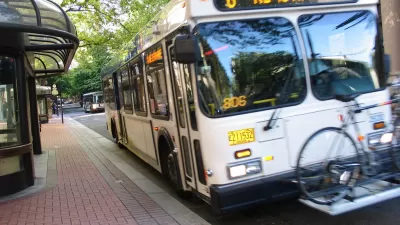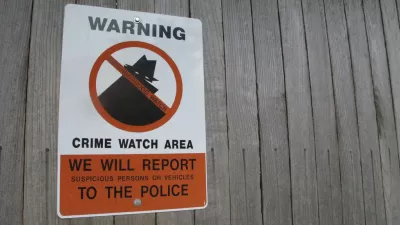The controversial theory that social and physical disorder is a cause of neighborhood crime has been successfully demonstrated with a series of six experiments.
A recent series of experiments in the Netherlands has shown some dramatic evidence in favor of the so-called broken windows theory. This theory predicts that neighborhood social and physical incivilities will incite people to engage in criminal behaviors. Examples of incivilities include litter, graffiti, loitering, and public intoxication. One experiment gave passers by the opportunity to steal a €5 note from an open mailbox. The portion of people who decided to pocket the money doubled when the area was littered with trash or covered in graffiti. The results of this study are compelling evidence that city governments should respond to signs of physical disorder early.
Thanks to Nick Helmholdt
FULL STORY: The "Broken Windows" Theory of Crime is Correct

Planetizen Federal Action Tracker
A weekly monitor of how Trump’s orders and actions are impacting planners and planning in America.

Vehicle-related Deaths Drop 29% in Richmond, VA
The seventh year of the city's Vision Zero strategy also cut the number of people killed in alcohol-related crashes by half.

As Trump Phases Out FEMA, Is It Time to Flee the Floodplains?
With less federal funding available for disaster relief efforts, the need to relocate at-risk communities is more urgent than ever.

More Apartments Are Being Built in Less-Dense Areas
Rising housing costs in urban cores and a demand for rental housing is driving more multifamily development to exurbs and small metros.

Plastic Bag Bans Actually Worked
U.S. coastal areas with plastic bag bans or fees saw significant reductions in plastic bag pollution — but plastic waste as a whole is growing.

Improving Indoor Air Quality, One Block at a Time
A movement to switch to electric appliances at the neighborhood scale is taking off in California.
Urban Design for Planners 1: Software Tools
This six-course series explores essential urban design concepts using open source software and equips planners with the tools they need to participate fully in the urban design process.
Planning for Universal Design
Learn the tools for implementing Universal Design in planning regulations.
Borough of Carlisle
Smith Gee Studio
City of Camden Redevelopment Agency
City of Astoria
Transportation Research & Education Center (TREC) at Portland State University
Camden Redevelopment Agency
City of Claremont
Municipality of Princeton (NJ)





























